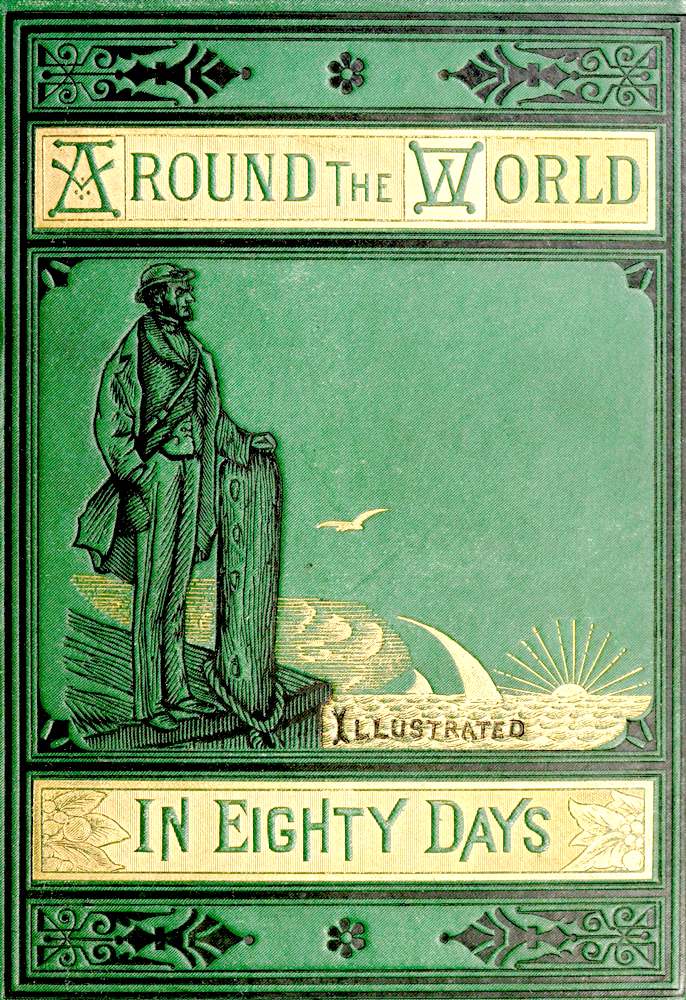|
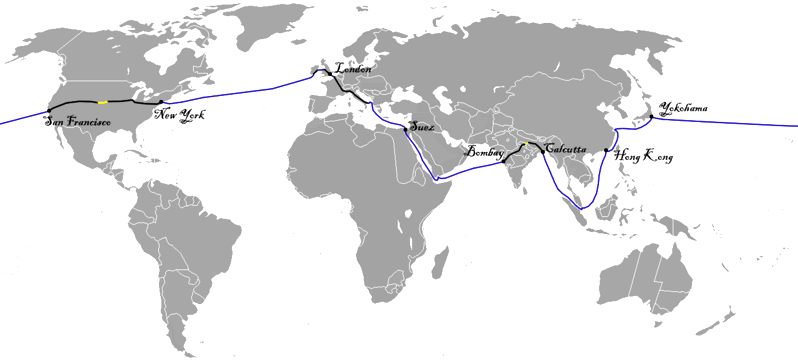
Map
of the route taken by Phileas Fogg, starting in London, then proceeding
east to Suez, Bombay, Calcutta, Hong Kong , Yokohama, San Francisco, New
York, and across the Atlantic
ocean to Ireland, then Liverpool England, and back to London. The route
planner below is for a circumnavigation on water in under 80 days, using
hydrogen, as per the author's prediction in The Mysterious Island. It
would be a major achievement if this was arranged to honor the 150th
anniversary of his publication.
<<<<
CHAPTER III.
Phileas Fogg, having shut the door of his house at half-past eleven, and having put his right foot before his left five hundred and seventy-five times, and his left foot before his right five hundred and seventy-six times, reached the
Reform
Club, an imposing edifice in Pall Mall, which could not have cost less than three millions. He repaired at once to the dining-room, the nine windows of which open upon a tasteful garden, where the trees were already gilded with an autumn colouring; and took his place at the habitual table, the cover of which had already been laid for him. His breakfast consisted of a side-dish, a broiled fish with Reading sauce, a scarlet slice of roast beef garnished with mushrooms, a rhubarb and gooseberry tart, and a morsel of Cheshire cheese, the whole being washed down with several cups of tea, for which the Reform is famous. He rose at thirteen minutes to one, and directed his steps towards the large hall, a sumptuous apartment adorned with lavishly-framed paintings. A flunkey handed him an uncut Times, which he proceeded to cut with a skill which betrayed familiarity with this delicate operation. The perusal of this paper absorbed Phileas Fogg until a quarter before four, whilst the Standard, his next task, occupied him till the dinner hour. Dinner passed as breakfast had done, and Mr. Fogg re-appeared in the reading-room and sat down to the Pall Mall at twenty minutes before six. Half an hour later several members of the Reform came in and drew up to the fireplace, where a coal fire was steadily burning. They were Mr. Fogg’s usual partners at whist: Andrew Stuart, an engineer; John Sullivan and Samuel Fallentin, bankers; Thomas Flanagan, a brewer; and Gauthier Ralph, one of the Directors of the Bank of England—all rich and highly respectable personages, even in a club which comprises the princes of English trade and finance.
“Well, Ralph,” said Thomas Flanagan, “what about that robbery?”
“Oh,” replied Stuart, “the Bank will lose the money.”
“On the contrary,” broke in Ralph, “I hope we may put our hands on the robber. Skilful detectives have been sent to all the principal ports of America and the Continent, and he’ll be a clever fellow if he slips through their fingers.”
“But have you got the robber’s description?” asked Stuart.
“In the first place, he is no robber at all,” returned Ralph, positively.
“What! a fellow who makes off with fifty-five thousand pounds, no robber?”
“No.”
“Perhaps he’s a manufacturer, then.”
“The Daily Telegraph says that he is a gentleman.”
It was Phileas Fogg, whose head now emerged from behind his newspapers, who made this remark. He bowed to his friends, and entered into the conversation. The affair which formed its subject, and which was town talk, had occurred three days before at the Bank of England. A package of banknotes, to the value of fifty-five thousand pounds, had been taken from the principal cashier’s table, that functionary being at the moment engaged in registering the receipt of three shillings and sixpence. Of course, he could not have his eyes everywhere. Let it be observed that the Bank of England reposes a touching confidence in the honesty of the public. There are neither guards nor gratings to protect its treasures; gold, silver, banknotes are freely exposed, at the mercy of the first comer. A keen observer of English customs relates that, being in one of the rooms of the Bank one day, he had the curiosity to examine a
gold ingot weighing some seven or eight pounds. He took it up, scrutinised it, passed it to his neighbour, he to the next man, and so on until the ingot, going from hand to hand, was transferred to the end of a dark entry; nor did it return to its place for half an hour. Meanwhile, the cashier had not so much as raised his head. But in the present instance things had not gone so smoothly. The package of notes not being found when five o’clock sounded from the ponderous clock in the “drawing office,” the amount was passed to the account of profit and loss. As soon as the robbery was discovered, picked detectives hastened off to Liverpool,
Glasgow, Havre, Suez, Brindisi, New York, and other ports, inspired by the proffered reward of two thousand pounds, and five per cent. on the sum that might be recovered. Detectives were also charged with narrowly watching those who arrived at or left London by rail, and a judicial examination was at once entered upon.
There were real grounds for supposing, as the Daily Telegraph said, that the thief did not belong to a professional band. On the day of the robbery a well-dressed gentleman of polished manners, and with a well-to-do air, had been observed going to and fro in the paying room where the crime was committed. A description of him was easily procured and sent to the detectives; and some hopeful spirits, of whom Ralph was one, did not despair of his apprehension. The papers and clubs were full of the affair, and everywhere people were discussing the probabilities of a successful pursuit; and the Reform Club was especially agitated, several of its members being Bank officials.
Ralph would not concede that the work of the detectives was likely to be in vain, for he thought that the prize offered would greatly stimulate their zeal and activity. But Stuart was far from sharing this confidence; and, as they placed themselves at the whist-table, they continued to argue the matter. Stuart and Flanagan played together, while Phileas Fogg had Fallentin for his partner. As the game proceeded the conversation ceased, excepting between the rubbers, when it revived again.
“I maintain,” said Stuart, “that the chances are in favour of the thief, who must be a shrewd fellow.”
“Well, but where can he fly to?” asked Ralph. “No country is safe for him.”
“Pshaw!”
“Where could he go, then?”
“Oh, I don’t know that. The world is big enough.”
“It was once,” said Phileas Fogg, in a low tone. “Cut, sir,” he added, handing the cards to Thomas Flanagan.
The discussion fell during the rubber, after which Stuart took up its thread.
“What do you mean by ‘once’? Has the world grown smaller?”
“Certainly,” returned Ralph. “I agree with Mr. Fogg. The world has grown smaller, since a man can now go round it ten times more quickly than a hundred years ago. And that is why the search for this thief will be more likely to succeed.”
“And also why the thief can get away more easily.”
“Be so good as to play, Mr. Stuart,” said Phileas Fogg.
But the incredulous Stuart was not convinced, and when the hand was finished, said eagerly: “You have a strange way, Ralph, of proving that the world has grown smaller. So, because you can go round it in three months—”
“In eighty days,” interrupted Phileas Fogg.
“That is true, gentlemen,” added John Sullivan. “Only eighty days, now that the section between Rothal and Allahabad, on the Great Indian Peninsula Railway, has been opened. Here is the estimate made by the Daily Telegraph:—
From London to Suez viâ Mont Cenis and Brindisi, by rail and steamboats ................. 7 days
From Suez to Bombay, by steamer .................... 13 ”
From Bombay to Calcutta, by rail ................... 3 ”
From Calcutta to Hong Kong, by steamer ............. 13 ”
From Hong Kong to Yokohama (Japan), by steamer ..... 6 ”
From Yokohama to San Francisco, by steamer ......... 22 ”
From San Francisco to New York, by rail ............. 7 ”
From New York to London, by steamer and rail ........ 9 ”
-------
Total ............................................ 80 days.”
“Yes, in eighty days!” exclaimed Stuart, who in his excitement made a false deal. “But that doesn’t take into account bad weather, contrary winds, shipwrecks, railway accidents, and so on.”
“All included,” returned Phileas Fogg, continuing to play despite the discussion.
“But suppose the Hindoos or Indians pull up the rails,” replied Stuart; “suppose they stop the trains, pillage the luggage-vans, and scalp the passengers!”
“All included,” calmly retorted Fogg; adding, as he threw down the cards, “Two trumps.”
Stuart, whose turn it was to deal, gathered them up, and went on: “You are right, theoretically, Mr. Fogg, but practically—”
“Practically also, Mr. Stuart.”
“I’d like to see you do it in eighty days.”
“It depends on you. Shall we go?”
“Heaven preserve me! But I would wager four thousand pounds that such a journey, made under these conditions, is impossible.”
“Quite possible, on the contrary,” returned Mr. Fogg.
“Well, make it, then!”
“The journey round the world in eighty days?”
“Yes.”
“I should like nothing better.”
“When?”
“At once. Only I warn you that I shall do it at your expense.”
“It’s absurd!” cried Stuart, who was beginning to be annoyed at the persistency of his friend. “Come, let’s go on with the game.”
“Deal over again, then,” said Phileas Fogg. “There’s a false deal.”
Stuart took up the pack with a feverish hand; then suddenly put them down again.
“Well, Mr. Fogg,” said he, “it shall be so: I will wager the four thousand on it.”
“Calm yourself, my dear Stuart,” said Fallentin. “It’s only a joke.”
“When I say I’ll wager,” returned Stuart, “I mean it.”
“All right,” said Mr. Fogg; and, turning to the others, he continued: “I have a deposit of twenty thousand at Baring’s which I will willingly risk upon it.”
“Twenty thousand pounds!” cried Sullivan. “Twenty thousand pounds, which you would lose by a single accidental delay!”
“The unforeseen does not exist,” quietly replied Phileas Fogg.
“But, Mr. Fogg, eighty days are only the estimate of the least possible time in which the journey can be made.”
“A well-used minimum suffices for everything.”
“But, in order not to exceed it, you must jump mathematically from the trains upon the steamers, and from the steamers upon the trains again.”
“I will jump - mathematically.”
“You are joking.”
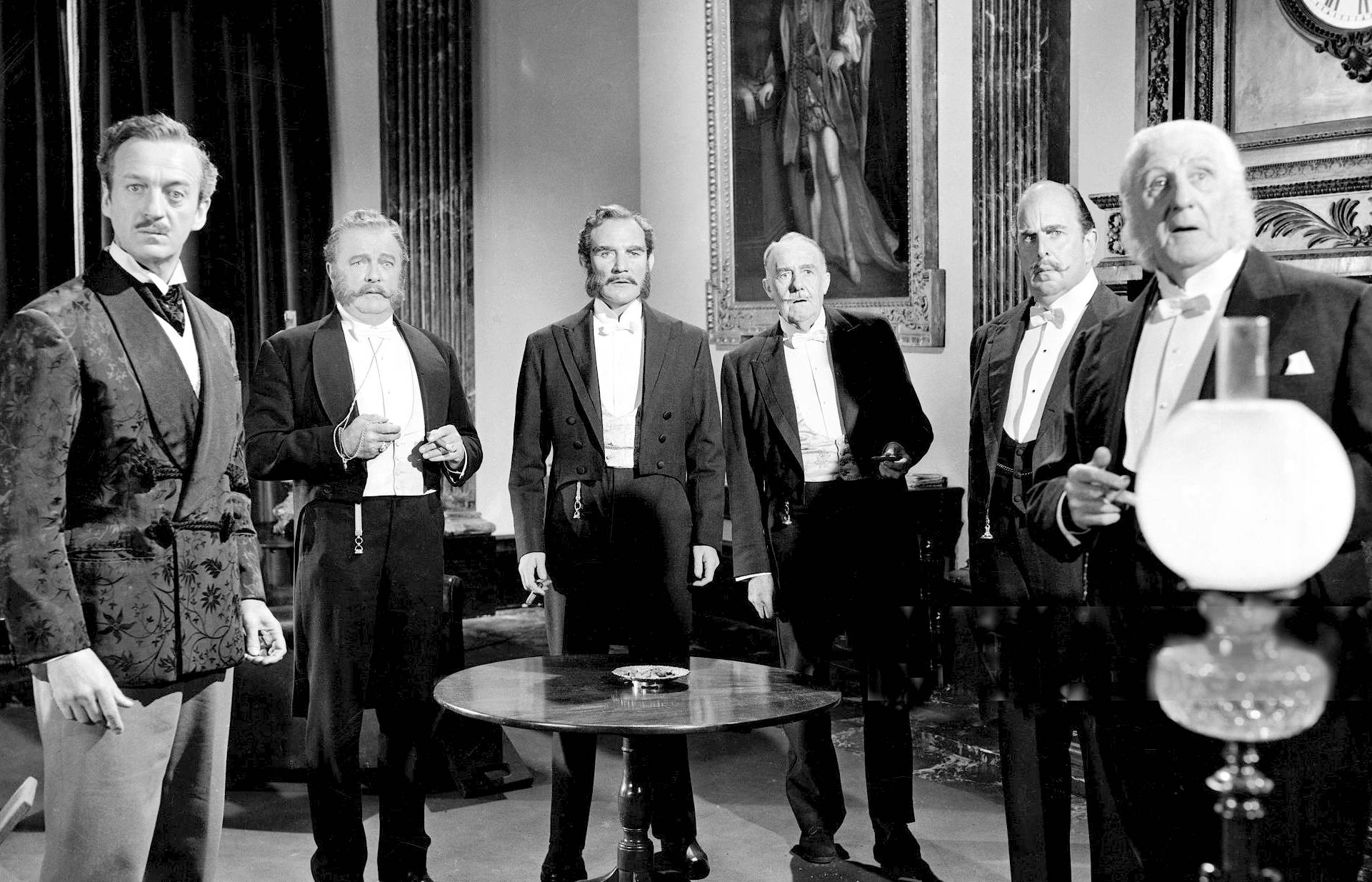
“A true Englishman doesn’t joke when he is talking about so serious a thing as a wager,” replied Phileas Fogg, solemnly. “I will bet twenty thousand pounds against anyone who wishes that I will make the tour of the world in eighty days or less; in nineteen hundred and twenty hours, or a hundred and fifteen thousand two hundred minutes.
Do you accept?”
“We accept,” replied Messrs. Stuart, Fallentin, Sullivan, Flanagan, and Ralph, after consulting each other.
“Good,” said Mr. Fogg. “The train leaves for Dover at a quarter before nine. I will take it.”
“This very evening?” asked Stuart.
“This very evening,” returned Phileas Fogg. He took out and consulted a pocket almanac, and added, “As today is Wednesday, the 2nd of October, I shall be due in London in this very room of the Reform Club, on Saturday, the 21st of December, at a quarter before nine p.m.; or else the
twenty thousand
pounds, now deposited in my name at Baring’s, will belong to you, in fact and in right, gentlemen. Here is a cheque for the amount.”
A memorandum of the wager was at once drawn up and signed by the six parties, during which Phileas Fogg preserved a stoical composure. He certainly did not bet to win, and had only staked the twenty thousand pounds, half of his fortune, because he foresaw that he might have to expend the other half to carry out this difficult, not to say unattainable, project. As for his antagonists, they seemed much agitated; not so much by the value of their stake, as because they had some scruples about betting under conditions so difficult to their friend.
The clock struck seven, and the party offered to suspend the game so that Mr. Fogg might make his preparations for departure.
“I am quite ready now,” was his tranquil response. “Diamonds are trumps: be so good as to play, gentlemen.”
>>>>
NEXT
CHAPTERS
1. - I. IN WHICH PHILEAS FOGG AND PASSEPARTOUT ACCEPT EACH OTHER, THE ONE AS
MASTER AND AS MAN
2. - II. IN WHICH PASSEPARTOUT IS CONVINCED THAT HE HAS AT LAST FOUND HIS IDEAL
3. - III. IN WHICH A CONVERSATION TAKES PLACE WHICH SEEMS LIKELY TO COST PHILEAS FOGG DEAR
4. - IV. IN WHICH PHILEAS FOGG ASTOUNDS
PASSEPARTOUT, HIS SERVANT
5. - V. IN WHICH A NEW SPECIES OF FUNDS, UNKNOWN TO THE MONEYED MEN, APPEARS ON ’CHANGE
6. - VI. IN WHICH FIX, THE DETECTIVE, BETRAYS A VERY NATURAL IMPATIENCE
7. - VII. WHICH ONCE MORE DEMONSTRATES THE USELESSNESS OF PASSPORTS AS AIDS TO DETECTIVES
8. - VIII. IN WHICH PASSEPARTOUT TALKS RATHER MORE, PERHAPS, THAN IS PRUDENT
9. - IX. IN WHICH THE RED SEA AND THE INDIAN OCEAN PROVE PROPITIOUS TO THE DESIGNS OF PHILEAS FOGG
10. - X. IN WHICH PASSEPARTOUT IS ONLY TOO GLAD TO GET OFF WITH THE LOSS OF HIS SHOES
11. - XI. IN WHICH PHILEAS FOGG SECURES A CURIOUS MEANS OF CONVEYANCE AT A FABULOUS PRICE
12. - XII. IN WHICH PHILEAS FOGG AND HIS COMPANIONS VENTURE ACROSS THE INDIAN FORESTS, AND WHAT ENSUED
13. - XIII. IN WHICH PASSEPARTOUT RECEIVES A NEW PROOF THAT FORTUNE FAVORS THE BRAVE
14. - XIV. FOGG DESCENDS THE LENGTH OF THE BEAUTIFUL VALLEY OF THE GANGES WITHOUT EVER THINKING OF SEEING IT
15. - XV. IN WHICH THE BAG OF BANKNOTES DISGORGES SOME THOUSANDS OF POUNDS MORE
16. - XVI. IN WHICH FIX DOES NOT SEEM TO UNDERSTAND IN THE LEAST WHAT IS SAID TO HIM
17. - XVII. SHOWING WHAT HAPPENED ON THE VOYAGE FROM SINGAPORE TO HONG KONG
18. - XVIII. IN WHICH PHILEAS FOGG, PASSEPARTOUT, AND FIX GO EACH ABOUT HIS BUSINESS
19. - XIX. IN WHICH PASSEPARTOUT TAKES A TOO GREAT INTEREST IN HIS MASTER, AND WHAT COMES OF IT
20. - XX. IN WHICH FIX COMES FACE TO FACE WITH PHILEAS FOGG
21. - XXI. IN WHICH THE MASTER OF THE “TANKADERE” RUNS GREAT RISK OF LOSING A REWARD OF TWO HUNDRED POUNDS
22. - XXII. PASSEPARTOUT DISCOVERS IT IS CONVENIENT TO HAVE MONEY IN ONE’S POCKET
AT THE ANTIPODES
23. - XXIII. IN WHICH PASSEPARTOUT’S NOSE BECOMES OUTRAGEOUSLY LONG
24. - XXIV. DURING WHICH MR. FOGG AND PARTY CROSS THE PACIFIC OCEAN
25. - XXV. IN WHICH A SLIGHT GLIMPSE IS HAD OF SAN FRANCISCO
26. - XXVI. IN WHICH PHILEAS FOGG AND PARTY TRAVEL BY THE PACIFIC RAILROAD
27. - XXVII. IN WHICH PASSEPARTOUT UNDERGOES, AT A SPEED OF 20 MPH, A COURSE OF MORMON HISTORY
28. - XXVIII. IN WHICH PASSEPARTOUT DOES NOT SUCCEED IN MAKING ANYBODY LISTEN TO REASON
29. - XXIX. IN WHICH CERTAIN INCIDENTS ARE NARRATED WHICH ARE ONLY TO BE MET WITH ON AMERICAN RAILROADS
30. - XXX. IN WHICH PHILEAS FOGG SIMPLY DOES HIS DUTY
31. - XXXI. IN WHICH FIX, THE DETECTIVE, CONSIDERABLY FURTHERS THE INTERESTS OF PHILEAS FOGG
32. - XXXII. IN WHICH PHILEAS FOGG ENGAGES IN A DIRECT STRUGGLE WITH BAD FORTUNE
33. - XXXIII. IN WHICH PHILEAS FOGG SHOWS HIMSELF EQUAL TO THE OCCASION
34. - XXXIV. IN WHICH PHILEAS FOGG AT LAST REACHES LONDON
35. - XXXV. IN WHICH PHILEAS FOGG DOES NOT HAVE TO REPEAT HIS ORDERS TO PASSEPARTOUT TWICE
36. - XXXVI. IN WHICH PHILEAS FOGG’S NAME IS ONCE MORE AT A PREMIUM ON ’CHANGE
37. - XXXVII. PHILEAS FOGG FINDS HE GAINED NOTHING BY HIS TOUR AROUND THE WORLD, UNLESS IT WERE HAPPINESS
PLOT
- AROUND
THE WORLD IN EIGHTY DAYS
The story starts in London on October 2, 1872. Phileas Fogg is a wealthy, solitary, unmarried gentleman with regular habits. The source of his wealth is not known and he lives modestly. He fires his former valet, James Forster, for bringing him shaving
water two degrees too cold. He hires as a replacement
Passepartout, a Frenchman of around 30 years of age.
Later that day in the Reform Club, he gets involved in an argument over an article in
The Daily
Telegraph, stating that with the opening of a new railway section in India, it is now possible to travel around the world in 80 days.
Fogg accepts a wager for £20,000 from his fellow club members, which he will receive if he makes it around the world in 80 days. Accompanied by his manservant
Passepartout, he leaves London by train at 8.45 p.m. on October 2, 1872, and thus is due back at the Reform Club at the same time 80 days later, on December 21.
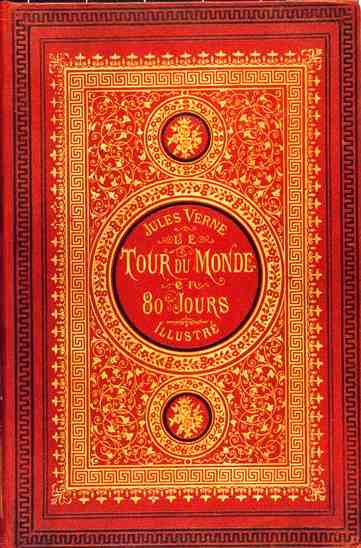
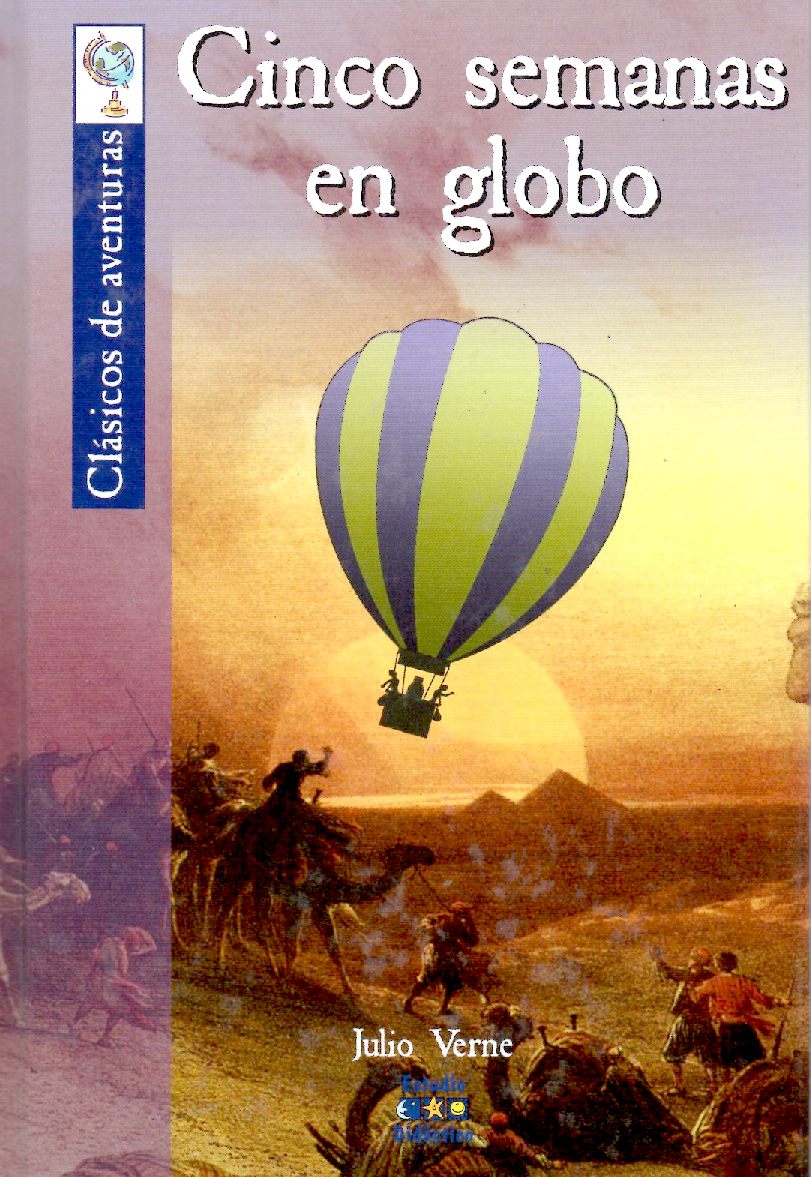
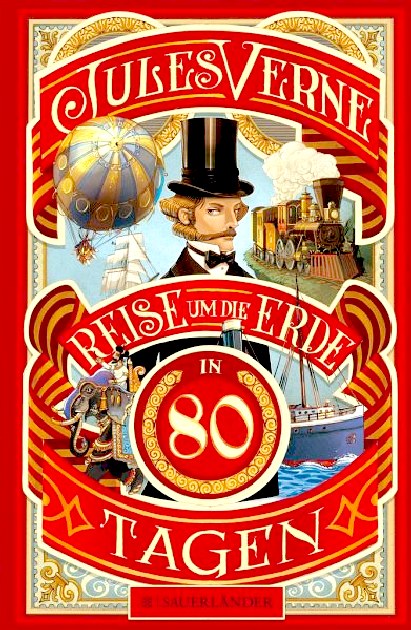
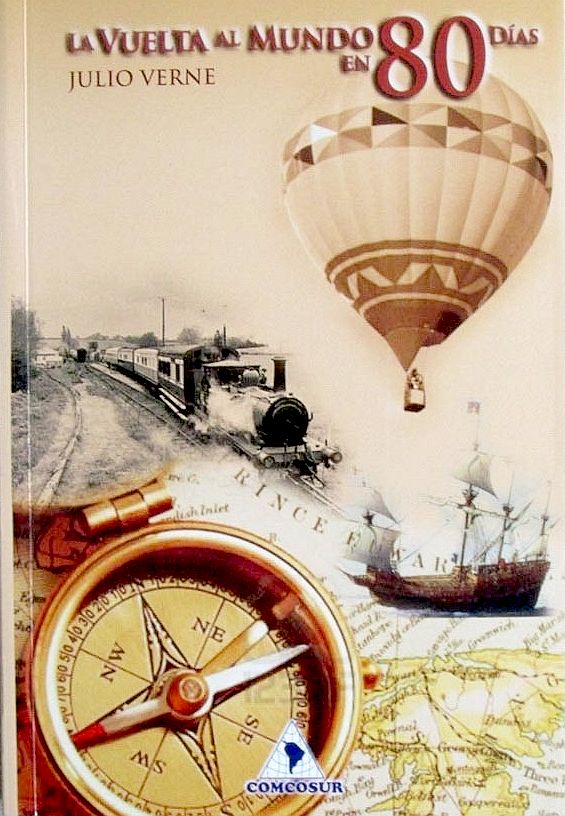

Many
of his stories today seem a little tame, as technology has caught up
with the imagination of the extraordinary French author, and Hollywood
has discovered Computer Generated Images (CGI) allowing super heroes to
grace our screens as never before. Computers are one thing that Verne
did not imagine or seek to portray.
Beginning in late 1872, the serialized version of Verne's famed Around the World in Eighty Days (Le Tour du monde en quatre-vingts jours) first appeared in print. The story of Phileas Fogg and Jean Passepartout takes readers on an adventurous global tour at a time when travel was becoming easier and alluring. In the century plus since its original debut, the work has been adapted for the theater, radio, television and film, including the classic 1956 version starring David
Niven. The TV series starring Pierce Brosnan runs for around 6 hours on
2 DVDs. A second TV series starring David Tennant was produced by the
BBC for 2021.
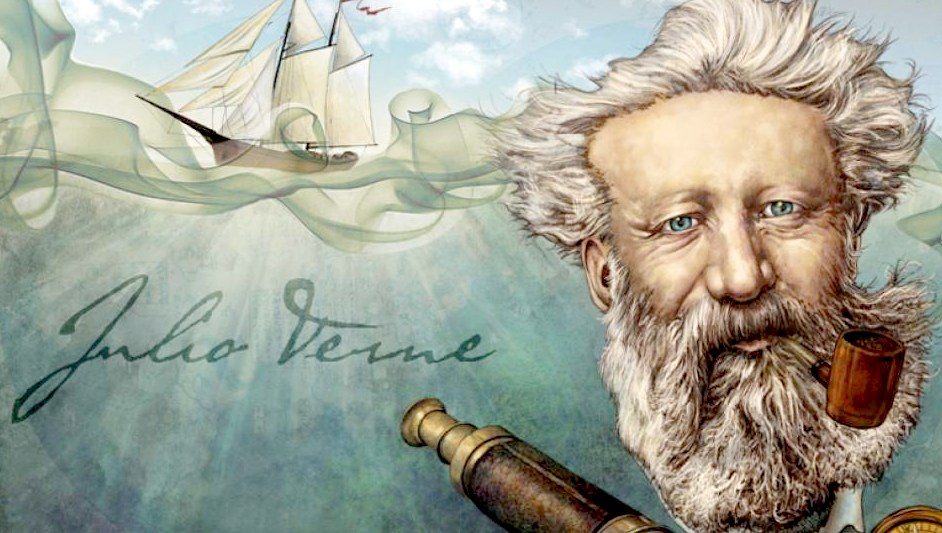
Jules
Verne is known as the Father of Science Fiction
Where
Jules Verne's suggested that it might be possible to travel Around The
World In 80 Days, we would like to extend that ethos to include
traveling in a Zero
Emission yacht (ZEWT or ZEV) driven by electric
hydro-jets? With the advent of solar power and liquid
hydrogen, it is a distinct possibility - on a scale of the wager
that the legendary Philleas Fogg entered into at the Reform Club in
1872.
|








